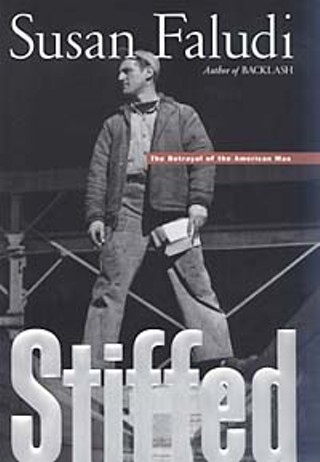Stiffed: The Betrayal of the American Male
Reviewed by Erica C. Barnett, Fri., Dec. 3, 1999

Stiffed: The Betrayal of the American Man
by Susan FaludiWilliam Morrow, 662 pp., $27.50
For those of us who grew up in the post-"post-feminist" world, Susan Faludi's Backlash was an invaluable primer on the history of the feminist movement and what it was they worked so hard to achieve. More important, Faludi's treatise on American women -- and the resistance they faced when they tried to rebel against a culture of ornamental, artificial femininity -- showed latter-day women just how much there still was to fight for, and how easily the accomplishments women won after decades of struggle could slip away.
Seven years later, Faludi's sophomore effort, Stiffed: The Betrayal of the American Man, poses a question for which feminism seems to have no response: Why, if men hold the reins of power everywhere, do so many of them feel listless, impotent, and dominated by the world? At 608 pages, Faludi's answer manages somehow to be both exhaustive and insufficient, leaving the reader wondering whether the author buys her own argument.
After traveling the country for six years and talking to dozens of men, Faludi determined that men's problems -- their "crisis," if you will -- consist chiefly of their inability to define themselves as men in a culture that no longer values traditionally "masculine" abilities like raising a family, holding down a job, and serving one's community. But the cast of characters she trots forth as typifying American men is, by Faludi's own admission, hardly typical. The characters that populate Stiffed are (in Faludi's phrase) almost exclusively men "on the margins" of society -- those so alienated by consumer culture and their lack of personal fulfilment that they have taken refuge in militias, gangs, and celebrity adulation.
Despite its limited cast of characters, Stiffed manages to captivate. Faludi's interviewing skills are impeccable, and her descriptions of her subjects -- who range from the pitiful to the reprehensible -- are sympathetic, not maudlin. Faludi talks to all manner of masculine misfits in her search for the source of men's "betrayal": porn stars, drag queens, Promise Keepers, and celebrities such as Neil Armstrong and Sylvester Stallone. The narrative that Faludi pulls together from the threads of their stories is a tightly woven, seamless tapestry, but her conclusion -- that men are in crisis because they were abandoned by their fathers and society, and now cling to consumer culture as a surrogate for their lost masculinity -- frays badly upon closer inspection. The problem with Stiffed is not that Faludi lacks ideas, or evidence -- it's that, more often than not, her premises don't lead clearly to her conclusions.
One gets the sense that Faludi lost track of her thesis somewhere between the boarded-up shipyards of Long Beach, California (where the book begins) and the sordid porno sets of Hollywood (where it ends). Conversely, her ultimate conclusion, reached in the book's final pages -- that men and women, after all, "hold the key to each other's liberation" -- seems hasty, thrown-together, and glib. Perhaps if Faludi had spent less time cataloging her travels and more time developing her arguments, her account of men's misfortune would have been more convincing.










